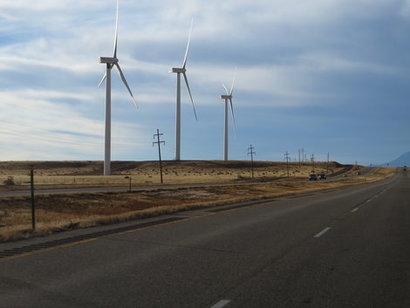
A burst of new wind farm announcements in the first quarter of 2019 propelled the total volume of US wind power construction and development activity to a record level according to the newly released US Wind Industry First Quarter 2019 Market Report.
The American Wind Energy Association’s (AWEA) report reveals that US project developers announced new wind farms with a total capacity of 6,146 megawatts (MW) in the first quarter of 2019, which is more than the capacity of all the currently operational wind farms in California. The additional capacity brings the US construction and advanced development pipeline to a record-breaking 39,161 MW, an 11 percent increase over the previous quarter. Eight states are now on track to double their installed wind capacity.
“With nearly 40,000 MW in development, America’s largest source of renewable energy generating capacity is on a path to grow by 40 percent in the near term” said Tom Kiernan, CEO of AWEA. “In doing so, we’ll create thousands of additional American jobs and new economic opportunities for factory towns and rural communities across the country.”
Of the total wind pipeline, 17,213 MW were under construction across 21 states at the end of first quarter. Texas boasted the most wind under construction with 6,528 MW—1,255 MW of which is new this year. Project developers also reported 21,949 MW of wind capacity in the advanced development stage, which also reached a record level. Projects in advanced development have not yet begun construction but are likely to come online in the near term because they have either signed a long-term contract, placed turbine orders, or are proceeding under utility ownership.
A total of 841 MW of wind projects came online during the first quarter, elevating the country’s total installed capacity to 97,223 MW. Iowa led the nation in new capacity installations with 536 MW brought online. This continues the robust growth the industry has seen in recent years.
The industry’s strong development pipeline is feeding growing US demand for low-cost, clean energy. The first quarter of 2019 saw the second strongest volume of power purchase agreements (PPAs) since AWEA began tracking procurement activity, with 2,717 MW of wind PPAs signed. Utilities signed contracts totaling 2,694 MW, led by Northern Indiana Public Service Company and National Grid. In addition, utilities announced plans to build and own 1,049 MW of wind in the first quarter, underscoring continued utility appetite to own and rate-base wind projects.
The drive for more wind energy has spurred innovation, bringing down costs and making wind the least expensive source of new electricity generation in much of the US And the number of projects deploying even more powerful and efficient wind turbines is growing. Nearly 30 percent of projects that have already selected a turbine model are deploying turbines with nameplate capacities of 3 MW or higher - with 3.5 MW and larger models being used in 18 different projects. Expanding turbine model variety allows developers to better customize wind farms to their local resource and deliver even more affordable energy to consumers.
On the offshore front, the year kicked off with an ambitious announcement from New York’s Governor Cuomo increasing the state’s offshore wind goal to 9,000 MW by 2035, up from the previous target of 2,400 MW. National Grid filed for approval of a 20-year contract to buy 400 MW from the Revolution Wind project at a fixed price of $98 per megawatt-hour (MWh), the second offshore wind PPA to come in below $100 per MWh. Leading energy developers continued fierce competition to develop America’s world-class offshore wind resources. In February, New York received bids from four offshore developers in response to its first solicitation for at least 800 MW of offshore wind. The winning bid will be announced later this spring.
The growth of wind power is good news for communities across America. AWEA released its 2018 Annual Market Report earlier this month, finding showed that wind energy’s economic benefits stretch from coast to coast. Wind power is a 50-state industry, with either a wind farm or a factory supplying the industry found in every state. Wind turbine technician remains the second-fastest growing career in the country, according to the US Bureau of Labor Statistics. At the end of 2018, more than 114,000 Americans worked in wind power. For the first time last year, AWEA began tracking state and local tax data and found the wind industry contributes over $1 billion every year in combined state and local taxes plus lease payments to landowners who host turbines.
For additional information:

